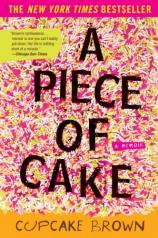Interview: March 17, 2006
March 17, 2006
In addition to practicing law with one of the top firms in the country, establishing a safe house for sexually abused girls, and giving motivational speeches nationwide, Cupcake Brown can now add "author" to her list of accomplishments. But she hasn't always been as fortunate, as she details in her memoir A PIECE OF CAKE. In this interview with Bookreporter.com's contributing writer Alexis Burling, Ms. Brown talks about her difficult past and what she hopes readers will take away from her experiences, while also clarifying some of the misinterpreted events recounted in her book.
Bookreporter.com: A PIECE OF CAKE is a no-nonsense retrospective of your life as an addict. In it, you describe your love affair with drugs and alcohol and your constant battle to kick the habit. What advice do you have for kids/teens/adults about drug usage beyond the usual "Just say No?" Are there more preventative measures society can take to educate people about drugs and their effects?
Cupcake Brown: There are many preventive measures. 12-step programs and rehab facilities exist in every town. However, each city and state has services that others may not. So each individual should check with his or her social service department to see what's available in the area.
BRC: In the beginning years of your life, you spent a lot of time surrounded by (and running away from) your incredibly abusive foster "families" (Diane, Connie) after being taken away from the family you truly loved (your Dad, Uncle Jr.) by the court. Some people might say that your descent into prostitution, addiction and poverty had a lot to do with the fact that you were taken away from your loved ones and became an ignored "product" of the System --- a System in desperate need of an overhaul. What are your thoughts on this?
CB: I believe that my descent into numerous self-destructive behaviors was not as a result of what happened to me, but the result of my reaction to what happened to me.
BRC: When you lived with your great-aunt in South Central L.A., you found much needed support in your new family of sorts, the Eight Tray Crips. These days, society tends to view gangs as roaming hoards of hoodlums who lie, cheat and steal their way through life --- thugs who should be feared, arrested, or pushed down. Do you see a way to turn these general ideas around so that gang members are seen as individuals rather than just products of their environment?
CB: I'm hoping that by reading my book, people get a better understanding of the attractiveness of gangs. They understand the unconditional love and support that's offered by gangs. However, I do not (currently) see a way to change how society views gangs. The ignorance runs too deep, the stereotypes too convincing, and the negativity too strong.
BRC: One of the most memorable scenes in A PIECE OF CAKE is the one where you walk into Ken Rose's law office where you worked as a legal secretary, and you are barefoot, rancid-smelling and emaciated --- "like one of those starving children in Africa." You had been living out of a dumpster and prostituting yourself, drinking relentlessly and doing drugs the entire time. You then walked 60 blocks to Ken Rose's office to essentially quit and when he saw you, he said, "Cup, don't quit. There's something about you worth saving." He then proceeded to call every detox unit in the area until he could find a place that would accept you. This scene brought tears to my eyes! What do you think Ken saw in you that made him give you a chance? How important do you think this kind of "mentor" is in accomplishing dreams?
CB: This event has been misinterpreted and misconstrued. And Ken has consistently been given improper credit. Ken is not the most important person in getting me to rehab; that was a team effort, and each member of the team is equally important --- except me (without my desire and willingness, the rest of the team could have done nothing). That team consisted of me, Ken, Dorothy (the firm administrator) and Sheila (the secretary who drove me to rehab). In this regard, Ken didn't give me a chance. I had already determined and decided that my life was worth saving. I made that determination upon seeing my reflection. I made that determination by walking 60 blocks to the firm. And I made the determination by being willing to quit my job --- my justification for using --- to save my life. I alone made the decision to get clean. Although Ken dialed the rehab phone numbers, it was Dorothy who told him which hospitals to call and it was Dorothy who obtained the numbers. Ken knew nothing about recovery. It was Dorothy who took the helm and showed me what to do.
Even after being in rehab, I relapsed. Because, again, my sobriety is up to and because of me --- not Ken, Rose, or anyone else. Please remember that regardless of what opportunities are put in front of a person, the bottom line is that it is up to the individual --- and only the individual --- and his or her willingness.
Ken didn't become a mentor until after I became sober.
BRC: Your sponsor, Venita, sounds like an inspirational, powerful, beautiful woman, with an intelligent head on her shoulders and the willpower to conquer the world three times over. From the moment you laid eyes on her, you described her as a woman to take notice of and one who could (and would) influence many lives, including your own. Seeing that she had such a positive impact on your recovery and your growth into who you are today, would you say that your book and your nationwide speaking engagements are your way of giving back to those in need as Venita gave back to you?
CB: Speaking is one way I give back.
BRC: What was writing the first page of your book like? Did you know that you wanted to publish the book when you started, or did it feel more like you were writing a personal journal in the beginning?
CB: The first chapter required reliving the most hellacious day of my life.
BRC: Is there anything you decided not to include in your memoir? If so, why?
CB: My stay in several other foster homes was left out because the book was already too long. Numerous drunken and dope escapades were left out as well because I couldn't remember them with sufficient certainty.
BRC: Do you worry that the people in your life will come out of the woodwork due to what you've written in your book? Have they?
CB: I can't worry, or control, what other people do or say. So far, all's quiet on the front.
BRC: In the San Francisco Chronicle in 2004, you mentioned that you were on a task force dedicated to opening a new treatment program and safe house in the near future for sexually exploited girls in San Francisco --- the first of its kind in the city and one of only a few in the United States. Has it opened? What other details can you offer about this?
CB: The safe house is up and running. Any questions about it, however, must be directed to SF District Attorney Kamala Harris, who is now responsible for its operations.
BRC: What do you think your Mom would say about you now? If you could say one thing to her, what would it be?
CB: I think my mom would say what God says, "Good work, my child." I would tell my mom (and my grandma) that I love them and miss them.
BRC: In the Epilogue, you write that you ran into your one-time boyfriend at a church function after eight years of not seeing him. You also mention that "to tell what happened would require the writing of another book." Might you give us a hint about what transpired, or is there truly another book in the works?
CB: What's written there is all I have to say about that.
BRC: You stress the importance of baby steps and setting goals in life to accomplish your dreams. You graduated magna cum laude without a high school diploma or G.E.D. You finished law school and got accepted to the Bar. You work for one of the 25 largest law firms in the United States. You just published your memoir and are going on a nationwide book tour. What "baby step" could possibly be next for such a driven, dynamite woman?
CB: There are many "baby steps" to come. When you quit taking baby steps, you're six feet under.




